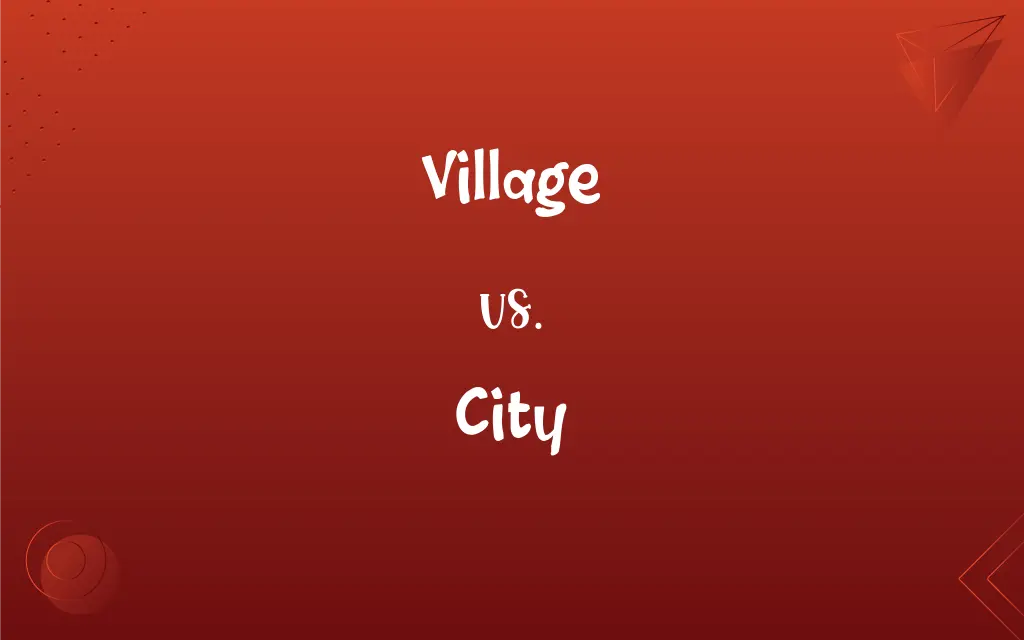Village vs. City: What's the Difference?
Edited by Harlon Moss || By Janet White || Published on December 7, 2023
A village is a small, rural community with limited infrastructure, whereas a city is a large, urban area with advanced infrastructure and amenities.

Key Differences
Villages are characterized by their small size and close-knit communities, often located in rural areas. They typically have limited infrastructure and resources. Cities, in contrast, are large urban areas with dense populations and extensive infrastructure, offering a wide range of services and amenities.
The economy in a village is usually based on agriculture or small-scale industries, with most residents involved in local, traditional occupations. Cities, however, have diverse economies, including various industries, corporate offices, and service sectors, attracting people with different professional backgrounds.
In terms of lifestyle, villages offer a slower pace of life, with a strong sense of community and tradition. City life is faster, with a focus on modernity, convenience, and individualism. The cultural experiences in cities are more diverse, reflecting the varied backgrounds of their inhabitants.
Education and healthcare facilities in villages are typically basic, with limited options. Cities boast advanced educational institutions and healthcare facilities, providing a wide range of options and specialties.
Environmentally, villages are closer to nature, often surrounded by agricultural land or natural landscapes. Cities face challenges like pollution and overcrowding but offer more in terms of technology and innovation.
ADVERTISEMENT
Comparison Chart
Size
Small and limited in extent
Large and extensive
Population Density
Low, with fewer inhabitants
High, with many inhabitants
Infrastructure
Basic facilities and infrastructure
Advanced and comprehensive infrastructure
Economic Activities
Mostly agriculture and local crafts
Diverse, including industries and services
Cultural and Social Life
Close-knit, traditional communities
Diverse, modern societies
ADVERTISEMENT
Village and City Definitions
Village
A small, rural community.
The village was known for its annual harvest festival.
City
A large town and urban area.
The city was bustling with activity day and night.
Village
A settlement smaller than a town.
The village had one main street lined with local shops.
City
A densely populated urban area.
She moved to the city for better job opportunities.
Village
A cluster of dwellings in a rural area.
She returned to her village after years in the city.
City
A center of population, commerce, and culture.
The city hosted an international film festival every year.
Village
A group of houses in a rural setting.
Their village was surrounded by rolling hills and farmland.
City
An area with extensive systems of housing, transportation, and utilities.
The city's skyline was dominated by skyscrapers.
Village
A locality in a rural environment.
The village relied heavily on the local farming community.
City
A municipal center.
The city council announced new urban development plans.
Village
A small group of dwellings in a rural area, usually ranking in size between a hamlet and a town.
City
A center of population, commerce, and culture; a town of significant size and importance.
Village
In some US states, an incorporated community smaller in population than a town.
City
An incorporated municipality in the United States with definite boundaries and legal powers set forth in a charter granted by the state.
FAQs
Are villages mostly found in rural areas?
Yes, villages are typically situated in rural or semi-rural areas.
What is the main economic activity in a village?
Agriculture is often the primary economic activity in villages.
How does the environment differ in villages and cities?
Villages are often closer to nature, while cities can face environmental issues like pollution.
What kind of lifestyle can be expected in a city?
City life is usually fast-paced, with a focus on modern amenities and conveniences.
Do cities offer better educational and healthcare facilities?
Generally, yes. Cities have a range of advanced educational institutions and healthcare facilities.
What defines a village?
A village is defined as a small community in a rural area with limited infrastructure.
What is the typical size of a village?
Villages are generally small with a few hundred to a few thousand residents.
What kinds of facilities are available in a village?
Villages usually have basic facilities like a primary school, a small health center, and local shops.
Are cities centers for economic activities?
Yes, cities are major economic centers with diverse industries and services.
Is there a difference in community life between villages and cities?
Yes, villages often have a close-knit community feel, while cities offer more anonymity and diversity.
How does the population of a city compare to that of a village?
Cities have significantly larger populations than villages, often in the millions.
Are there cultural differences between villages and cities?
Yes, villages often maintain traditional customs, while cities have a mix of various cultures.
Are cities always more expensive than villages?
Often, but not always. The cost of living can vary greatly depending on the specific city or village.
What defines a city?
A city is a large and densely populated urban area with advanced infrastructure and a variety of services.
Do cities have more advanced technology than villages?
Generally, cities have more access to modern technology and infrastructure.
Is transportation more developed in cities?
Yes, cities typically have more developed and diverse transportation systems.
Do cities offer more job opportunities than villages?
Generally, yes, due to the diverse range of industries and services in cities.
Is there a difference in governance between villages and cities?
Yes, cities typically have more complex governance structures and larger administrative bodies.
Can a village become a city?
Yes, if it grows significantly in population and infrastructure, it can be reclassified as a city.
Can villages be part of metropolitan areas?
Sometimes, especially when they are on the outskirts of large cities.
About Author
Written by
Janet WhiteJanet White has been an esteemed writer and blogger for Difference Wiki. Holding a Master's degree in Science and Medical Journalism from the prestigious Boston University, she has consistently demonstrated her expertise and passion for her field. When she's not immersed in her work, Janet relishes her time exercising, delving into a good book, and cherishing moments with friends and family.
Edited by
Harlon MossHarlon is a seasoned quality moderator and accomplished content writer for Difference Wiki. An alumnus of the prestigious University of California, he earned his degree in Computer Science. Leveraging his academic background, Harlon brings a meticulous and informed perspective to his work, ensuring content accuracy and excellence.







































































